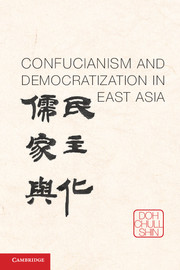Book contents
- Frontmatter
- Contents
- Acknowledgments
- Introduction
- Part i Confucianism and Confucian East Asia
- Part ii Upholding Confucian Legacies
- 3 Confucianism as a Hierarchical Way of Life
- 4 Confucianism as a Government of Paternalistic Meritocracy
- Part iii Engaging in Civic Life
- Part iv Embracing Democracy
- Part v Final Thoughts
- References
- Index
3 - Confucianism as a Hierarchical Way of Life
from Part ii - Upholding Confucian Legacies
Published online by Cambridge University Press: 05 June 2012
- Frontmatter
- Contents
- Acknowledgments
- Introduction
- Part i Confucianism and Confucian East Asia
- Part ii Upholding Confucian Legacies
- 3 Confucianism as a Hierarchical Way of Life
- 4 Confucianism as a Government of Paternalistic Meritocracy
- Part iii Engaging in Civic Life
- Part iv Embracing Democracy
- Part v Final Thoughts
- References
- Index
Summary
In the West, for centuries Confucius has been known as the founder of Confucianism, but interestingly, in China where he was born in the small feudal state of Lu and lived his entire life (551–479 B.C), there is no term equivalent to Confucianism (Tu 1998a, 3), nor is there any corresponding term in any of the other East Asian countries where he has been honored and respected as the most influential philosopher and teacher for more than two thousand years. In the sixteenth century, an Italian Jesuit priest, Matteo Ricci, coined the term “Confucianism” after he Latinized the name “Kong Fuzi” to “Confucius” and introduced to Europeans Confucius's teachings and those of his disciples. Subsequently, Confucianism influenced Voltaire and other European Enlightenment thinkers (Creel 1949, chap. 15; Mungello 1991; see also Collins 2008).
In the West, Confucianism was introduced as China's traditional system of social ethics, which Confucius, Mencius, and their students explicated in the works known as the Confucian classics (Yao 2000, 47–67). The most important of these works are The Analects of Confucius, a collection of conversations, questions, and answers between Confucius and his students, and the seven books of Mencius (371–289 B.C.), who was a principal interpreter and defender of Confucius's teachings. For the past two thousand years, the ideas presented in these two Confucian classics and others, including The Great Learning and The Doctrine of the Mean, have been subjected to different applications and interpretations (Tan 2003a, 7). As a result, Confucianism as a concept has taken on a variety of meanings in different places and at different times (Nosco 2008, 21; Tu 1994, 146–9; see also C. Cheng 2002).
- Type
- Chapter
- Information
- Confucianism and Democratization in East Asia , pp. 73 - 105Publisher: Cambridge University PressPrint publication year: 2011

